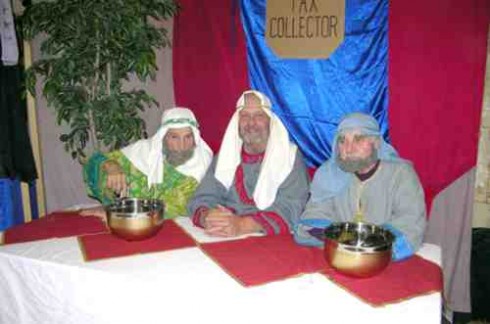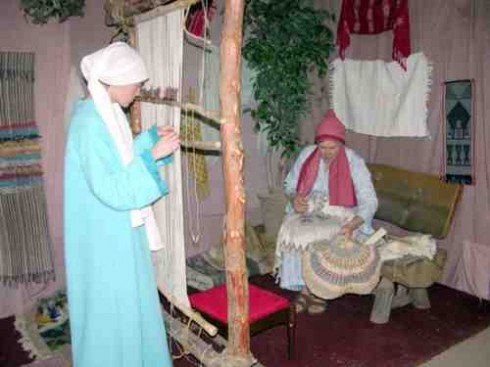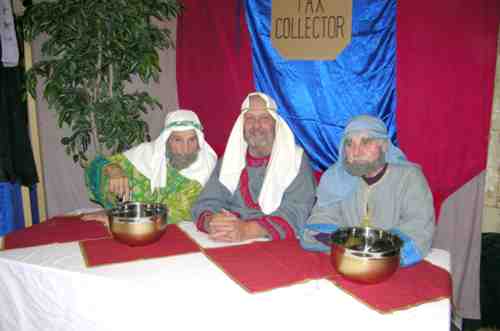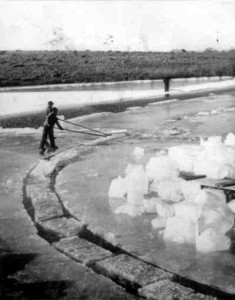Article by Lynda La Rocca
Mountain Life – December 2008 – Colorado Central Magazine
HEY, I’m a law-abiding citizen. And I really do want to “render unto Cæsar the things which are Cæsar’s.” But I’d feel a lot more cheerful about paying my taxes if I weren’t being prodded toward the tax collectors by spear-wielding Roman guards.
“Move along!” these toga-clad tough guys order my husband Steve and me when we try to slip a few coins to several ragged beggars. “You’ll be free of that money soon enough!” a soldier snaps before wading back into the throng of merchants, pilgrims, shepherds, and money changers gathered at Bethlehem Marketplace.
Presented every other year during one holiday-season weekend (this year it’s December 12 and 13) by Buena Vista’s Valley Fellowship Church, this strikingly realistic “walk-through drama” captures the sights, sounds, and smells of the little town of Bethlehem as it may have appeared some 2,000 years ago when Jesus was born.

Tent-like draped fabric, scenic backdrops, and strategically arranged greenery transform the church’s spacious gymnasium into a bustling village in the midst of a mandatory census, a population and property evaluation periodically ordered by the region’s Roman rulers. It was the decree of Roman Emperor Cæsar Augustus that the people return to their ancestral homes to be counted in just such a census that brought Mary and Joseph to Bethlehem, where Mary gave birth to her firstborn, a son she named Jesus.
Visitors wandering the serpentine lanes of Bethlehem Marketplace are encouraged to interact with the potters, basket weavers, spice merchants, fishmongers, butchers, bakers, and candlestick-makers who have set up shop in nearly two dozen stalls, displaying goods ranging from clay bowls and tanned leather to live rabbits, doves, and rather raucous chickens.
In one corner, shepherds tend live goats, sheep, and a donkey; in another, barefooted grape-stompers turn real grapes into juice to the rhythm of musicians playing wooden flutes and drums. Scribes painstakingly copy fragile manuscripts, seemingly oblivious to the cries of a patient undergoing treatment in the nearby surgeon’s quarters. Hens cluck, sheep bleat, mothers call to their children, and vendors loudly hawk their wares.
It’s an incredibly authentic atmosphere, made even more so by a cast — mostly church members along with some community members — that stays so much in character that the actors forgo such modern accouterments as wristwatches, nail polish, makeup, even eyeglasses. And bewildered looks are about the only response they give to visitors who question them about, or make references to, anything that occurred after the time of Christ’s birth.
Although the cast does have a script, much of their dialogue is ad-libbed — which makes for some interesting conversations with visitors, who play the roles of returning residents whose first task is to fill out a whimsical “Bethlehem Census” form.
Each household is instructed to estimate the value of its possessions to the nearest denarius, specify how many of its sons are “capable of handling a sword,” and itemize its livestock, camels included.
A clutch of impervious money changers then confiscates the completed forms and insists that the new arrivals turn over all their native currency — actually paper “money” that each visitor receives at the entrance — in exchange for Roman “coins.”

Drawn immediately into the spirit of things, Steve peers at his meager handful of coins. “Is this all I get?” he asks.
“Take it and go,” a Roman soldier orders us, brandishing his sword.
As we pass each market stall en route to the tax collectors’ booth, eager merchants entreat us to stop and purchase their wares.
“This robe would look lovely on you,” a woman assures me, unfolding a length of colorful striped cloth. “As would this,” says another, holding up a silver necklace.
Now it’s my turn to enter into full role-playing mode. “Our money’s for the tax collectors,” I say.
“Bah!” the first woman exclaims, not missing a beat. “The Romans take everything we have.”
Continuing along the narrow pathways, we follow the smell of fresh bread to the bakery, where I explain that our tax burden has left us no money to buy food (a lament that seems to echo through the ages).
“Those Romans!” the baker murmurs, shaking her head. “But you must be hungry,” she adds, holding out a plate of crusty bread. “Please, take some.”
We’re still chewing when other sympathetic vendors invite us, despite our cash-strapped status, to sample orange slices, nut-stuffed dried dates, miniature cookies, and tiny cups of “wine” (really purple grape juice).
Revived and refreshed, we pause at the town well for the ancient equivalent of a coffee-klatsch, listening to several women who have stopped drawing water to discuss a momentous event.
“Did you hear that a child has been born in a stable?” one asks.
Rumor has it, they say, that the new mother was forced to lodge there after being turned away from Bethlehem’s overcrowded inn.
She isn’t the only one. We, too, are out of luck when we arrive at the inn, where the proprietor waves us off, pointing to a sign that clearly states, “NO ROOMS.”
And so we reluctantly head to the tax collectors’ booth, where three bearded and robed men ignore our pleas for leniency, take all our money, and hurry us along — to the church’s adjoining arboretum. There, lush, flowering plants and trees surround a Living Nativity, complete with a tiny, sometimes squirming, sometimes sleeping “baby Jesus.”
Leaping forward in Biblical time, the production’s final scene features an angel announcing Christ’s resurrection.
This vivid and evocative trek through the ages concludes with more live music and refreshments. But Steve and I, in the throes of a more spiritual hunger, immediately get back in line to retrace our steps through Bethlehem Marketplace.
Who knows? Maybe this time, we’ll have better luck and the tax collectors will grant us an extension — or perhaps the Roman government will step in with a bailout offer.
Lynda La Rocca writes from Twin Lakes.


